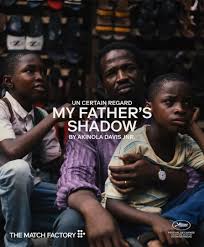The announcement that Akinola Davies’ debut feature film, “My Father’s Shadow”, will premiere in May 2025, at Cannes Film Festival is more than just a personal milestone—it’s a seismic moment for Nollywood and Nigeria’s cultural influence on the global stage. As a British-Nigerian director with a background in music videos, fashion films, and experimental shorts, Davis represents a new generation of filmmakers bridging the gap between African storytelling and world-class cinema.
Why This Premiere Matters for Nigeria:
- Global Recognition for Nigerian Cinema
For decades, Nollywood has been the world’s second-largest film industry by output, yet its presence at prestigious festivals like Cannes, Venice, or Sundance has been minimal.The inclusion of “My Father’s Shadow” signals that Nollywood stories—and filmmakers with ties to Nigeria—are capable of competing alongside Hollywood and European auteurs.
This elevates the perception of Nollywood globally, positioning it as an industry that produces world-class content worthy of critical acclaim.
For Nigeria, this achievement fosters pride and validates decades of efforts to refine filmmaking techniques while maintaining authentic cultural narratives. It also opens doors for other Nollywood filmmakers to aspire to similar heights, knowing that their stories can resonate beyond local audiences.
- Cultural Representation and Storytelling
AKINOLA Davis’ dual heritage—British-Nigerian—brings a unique lens to his storytelling. His film likely bridges cultures, offering universal themes through a distinctly Nigerian perspective. At Cannes, such representation matters deeply because it allows international audiences to engage with Nigerian experiences, history, and emotions without reducing them to stereotypes.
This aligns with a growing trend where diaspora filmmakers use their platforms to highlight underrepresented voices. For Nigeria, this means more opportunities to share its rich cultural tapestry with the world. It also challenges preconceived notions about African cinema being monolithic or overly focused on poverty and struggle, instead showcasing nuanced, layered narratives.
- Economic Opportunities for Nollywood
A Cannes premiere doesn’t just bring prestige—it attracts international distributors, sales agents, and investors.The success of “My Father’s Shadow” at Cannes could catalyze economic growth within Nollywood. International exposure often leads to increased investment from foreign distributors, streaming services, and co-production partners seeking access to African markets. Additionally, collaborations between Nollywood and international studios might become more common, bringing higher budgets, better technology, and improved training for local filmmakers.
Furthermore, the buzz generated by the film’s premiere may boost tourism and interest in Nigeria as a filming destination. Locations featured in the movie could attract future productions, much like how South Africa and Morocco have benefited from hosting major Hollywood projects.
- Inspiration for Aspiring Filmmakers
Seeing a filmmaker like AKINOLA Davis achieve such a milestone inspires young creatives across Nigeria and the diaspora. Akinola Davies belongs to a growing wave of diaspora filmmakers (like Andrew Dosunmu and Obi Emelonye) who merge Western training with Nigerian storytelling.By blending British and Nigerian influences, he shows that dual identities can enrich cinematic narratives, making them relatable to wider audiences.His journey demonstrates that Nigerian stories told with authenticity and artistry can transcend borders. This may encourage more Nigerian diaspora creatives to return home and contribute to Nollywood’s growth—bringing technical expertise, funding, and global networks, as a new wave of emerging talents strive to emulate his success.
- Strengthening Diaspora Connections
As a British-Nigerian filmmaker, AKINOLA Davis embodies the bridge between Nigeria and its diaspora community. His participation in Cannes reinforces the idea that Nigerians abroad remain connected to their roots and are using their skills to amplify homegrown stories. This strengthens cultural ties and encourages collaboration between Nollywood and diaspora creatives, fostering a global network of Nigerian storytellers.Such partnerships can enhance Nollywood’s reach, ensuring that Nigerian films find homes in international festivals, cinemas, and digital platforms worldwide.
Conclusion
The premiere of “My Father’s Shadow” at Cannes marks a turning point for Nigeria and Nollywood. Davis’ success serves as a reminder that talent exists abundantly in Nigeria; what’s needed now is an enabling environment to nurture and export this creativity effectively.
It represents validation of the industry’s potential, amplifies its global visibility, and sets a precedent for future generations of filmmakers. More than just a personal triumph for AKINOLA Davis, this event symbolizes hope, possibility, and the undeniable power of storytelling rooted in culture yet resonant universally.
Akinola Davis’ My Father’s Shadow at Cannes 2025 isn’t just a win for him—it’s a win for Nigeria, African cinema, and the future of Nollywood. The world is watching, and this could be the dawn of a new golden age for Nigerian filmmaking. By leveraging this moment strategically, Nigeria can position itself as a hub for innovative, impactful cinema, paving the way for sustained growth and influence in the global film landscape.

